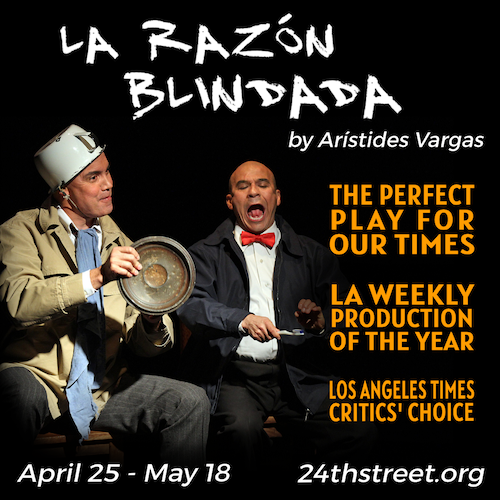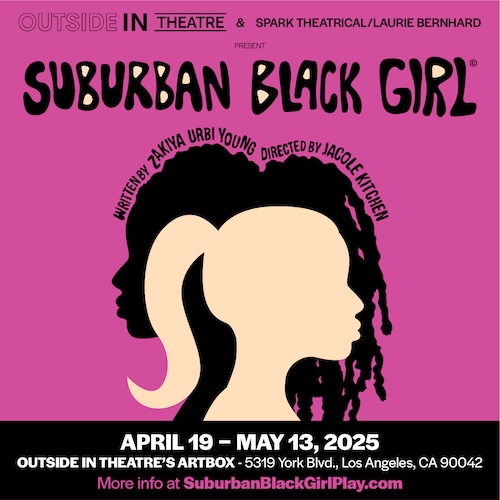Trouble the Water
Reviewed by Amanda L. Andrei
Will Geer Theatrical Botanicum
Thru Oct. 2
RECOMMENDED
Amidst the screeching cicadas and shady oak trees, Theatricum Botanicum transforms into an epic stretch of nearly 80 years in South Carolina and Washington D.C. in the world premiere of Trouble the Water, inspired by the true and little-known story of Robert Smalls, the first African-American hero of the Civil War.
After five years in Southern California, this is the first time I have encountered the Civil War in the region. Coming from (Northern) Virginia, I was constantly reminded of the War Between the States, from elementary schools named after battles, to statues of soldiers around street corners. Here in LA, American history seems fresher and younger, more removed from the nation’s legacy of slavery.
Trouble the Water brings it to us as exemplified through Robert (nicknamed “Trouble”) Smalls as he is born into slavery and emerges as a free man, thanks to his courage in commandeering a Confederate warship into Union waters, thereby carrying his family and others to freedom.
The a cappella group Street Corner Renaissance Choir — Charles (Sonny) Banks, Robert Henley III, Maurice Kitchen, Torrence Brannon Reese and Anthony Snead —serenade us into the play with Negro spirituals, introducing an elderly, ancestral Robert Smalls (Gerald C. Rivers, who also directs), imploring the audience for grace about any artistic liberties and the truth of what we are about to witness. We plunge into a frenetic scene, South Carolina in 1839, with an enslaved man (Clarence Powell) running away, while at the same time the plantation mistress (Robyn Cohen) hysterically births her first child, shortly followed by an enslaved attendant (Earnestine Philipps) giving birth to Smalls, and the runaway man publicly hanged as the victim’sbrother (Rodrick Jean-Charles) mourns from afar.
It’s a turbulent, spectacular scene, the ensemble filling the entirety of the stage with their cries. The contrasts between births – comical, with the white mistress in her bedroom apologizing for having a girl, versus deeply potent with the black woman sturdied against a tree, using the land to midwife her labor pangs. These are powerful origin stories for the events about to unfold. That they are woven among a man’s death for seeking freedom captures the highly charged political atmosphere of the antebellum South. And where should an audience direct their gaze? At the woman giving birth, at the man dying? How poignant that the violence takes place nearly in the wings, so that a spectator must choose what they witness or divide their attention between events, swinging between life and death. Rivers’s staging shines in capturing this chaos of the era and the momentous emergence of Smalls as an American hero.
Adaptation is no easy task, and Ellen Geer’s reworking of Rebecca Dwight Bruff’s 2019 award-winning historical novel is skillful, choosing dramatic yet intimate moments to move the story of Smalls and his family from birth to death. The older and younger Smalls onstage together, one often watching the other, also serve as soundings boards for each other, while the older Smalls narrates and comments upon transitions.
Terrence Wayne Jr. makes a charming, roguish younger Smalls/Trouble, attentive and curious, energetic and eager despite the oppression of slavery surrounding him and his family, embodied by the seemingly kind white master (Alistair McKenzie), the odious neighboring slaveowner (Franc Ross), and his son (Ethan Haslam as the older sonand Sage Michael Stone as the younger son.
Wayne and Rivers are particularly striking as the younger and elder Smalls, speaking to each other with hope and trust from already a huge stage distance, further underscoring the theme of faith in the knowledge of one’s higher self. Perhaps this is what allows for the awareness and possibility of forgiveness to one’s oppressors?
In her portrayal of Lydia, the enslaved attendant, Phillips offers a tour-de-force of storytelling, humor, and ferocity; there emerges a complex portrayal of the love and protection between a Black mother and son.
After defending another enslaved man, Smalls is jailed, beaten, and sent away to the port city of Charleston. Eventually he joins the enslaved crew of a Confederate steamer ship and becomes an adept navigator, despite the Confederate officers banning Black sailors from piloting their ships. And most importantly, he meets his future wife, Hannah (Tiffany Coty), an enslaved woman with a daughter, who gives him the fierce courage to risk their lives for freedom. Their courtship is sweet and sexy, raising the stakes all the higher when Hannah reveals past traumas and Smalls commits himself to protecting her and their growing family.
Indeed, this play walks the fine line of how to portray violent oppression: avoid it, or realistically reveal its brutality? The n-word is uttered several times, spat out in racist anger. The very image of the prop noose may be sickening to some. An enslaved woman is tied to a tree and lashed; another enslaved woman’s eye is put out by the plantation mistress. Yet the violence is stylized only in the way theater can do so, leaving space between bodies, slowing down movement, choosing whether the violence is front and center or to the side. As a result, a spectator may be disturbed, but not desensitized, and this production is wise to not erase historical traumas, but rather dramatize them as symbols of the era that continue today. If anything, I winced at some audience reactions, such as when the white master tellsSmalls not to look at any white women in Charleston or “your business might get cut off” and several chuckles rippled through the crowd. Who else heard that line and got chills thinking of Emmett Till and the legacy of killing Black people in America? Who else saw the connection between today’s violence and its historical roots?
And yet, Trouble the Water is infused with hope and triumph. In the end, Smalls shows grace to those who enslaved him, accomplishes much in social changes for Black Americans (and implicitly, all Americans), and learns more about his family than he had realized. The ending feels clean and wrapped up, but considering the traumas and joys witnessed and how few people know about Robert Smalls, our hero deserves grace as well. And when the evening has cooled and we leave the Theatricum with its shady oaks and noisy cicadas, how will this play give us hope or trouble our own perspectives of American history and the present? Could we find forgiveness for our oppressors? Could we find courage to defend our families and autonomy against insidious systems and mindsets that would seek to see us trapped or dead?
Will Geer Theatrical Botanicum, 1419 N. Topanga Canyon Blvd., Topanga; in rep, check web site for schedule; thru Oct. 2. theatricum.com












